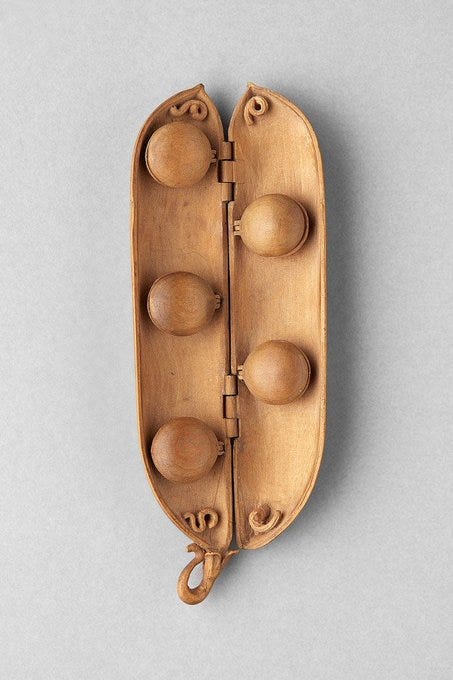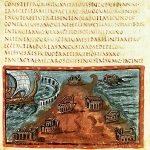By Armand D'Angour, Tutorial Fellow and Professor of Classics at Jesus College, Oxford
Students who read the charming fourth poem in Catullus’s collection learn that it describes how the poet travelled from his foreign posting in Bithynia (Pontus) back to his home on Lake Garda (Sirmio). He writes as if he’s showing the boat to friends. The boat itself then recounts its journey from the the Black Sea region through the Adriatic to its final resting-place on Lake Garda, where it is dedicated to Castor and Pollux, twin gods of sailors.
There are reasons to think that this cannot be meant to be a real boat:
1) Catullus indicates that it’s made from Pontic boxwood (Cytore buxifer), a type of wood that (unlike, say, pinewood) is too dense for shipbuilding – it was used for toys such as the child’s top in Virgil’s Aeneid Book 8.
2) The final leg to Lake Garda would require navigation up the Mincio River; sea-going boats were typically too deep-drafted for river navigation.
3) There’s a focus on diminutives in the poem: the boat itself is called a phasellus (cowpea), it has ‘little oars’ (palmulae), and it says it is faster than a floating piece of wood (trabis natantis).
4) It has come to rest on an ‘unmoving lake’ (usque limpidum lacum) – a description that doesn’t suit Lake Garda, which can become extremely choppy in heavy rain and hail.
The most likely interpretation, therefore, is that it’s meant to be a model boat. If it was dedicated as a votive object in a shrine (say, in Catullus’s house) to the Twin Gods, it would rest on an ‘unmoving’ wooden or glass surface. The journey it describes is no doubt the one Catullus will have taken back home; but the boat itself is not one that carried him there, but one that he carried. (The scholar John Griffith pointed out in a 1983 article that the Latin words erum tulisse could mean both ‘it bore its master’ or ‘its master bore it’).
Perhaps, then, Catullus carved a model boat, or perhaps he is simply imagining one. Boxwood trees have small boatshape pods – one could call them phaselli – that when dry can be carved. The pod shown above is around 4 inches long. Place it on a table, and you have a phasellus sailing on an ever-still lake, a miniature marvel to show off to your guests – as it tells its story in gently rocking iambic metre.
You see, my friends, this little model boat?
She claims she was the fastest of her kind,
and that no other piece of wood afloat
could beat her using sails and oars combined.
The Adriatic with its angry mien
will not deny this, she insists, nor will
the winding Cyclades, nor noble queen
of islands, Rhodes, nor Thracian tempests chill,
nor rough Propontis nor the Pontic sea
where once, before she sat afloat and fair,
she stood in leafy woods, a rustling tree
on Mount Cytorus, creaking in the air.
“You knew my nature then, and know it now,
Pontine Amastris” (so the toy boat says);
‘You too, Cytorus, where the box-trees bow
on ridges where I stood in childhood days
and in your waves first dipped my little oars.
From there across the overwhelming tides
my owner ferried me to distant shores,
as winds blew first to port then starboard sides,
or both at once. I never made a vow
to come to port, not once, until I passed
to this unmoving lake, where resting now
I pledge myself to you, Twin Gods, at last.”
Phasellus ille, quem videtis, hospites,
ait fuisse navium celerrimus,
neque ullius natantis impetum trabis
nequisse praeterire, sive palmulis
opus foret volare sive linteo.
et hoc negat minacis Hadriatici
negare litus insulasve Cycladas
Rhodumque nobilem horridamque Thraciam
Propontida trucemve Ponticum sinum,
ubi iste post phasellus antea fuit
comata silva: nam Cytorio in iugo
loquente saepe sibilum edidit coma.
Amastri Pontica et Cytore buxifer,
tibi haec fuisse et esse cognitissima
ait phasellus; ultima ex origine
tuo stetisse dicit in cacumine,
tuo imbuisse palmulas in aequore,
et inde tot per impotentia freta
erum tulisse, laeva sive dextera
vocaret aura, sive utrumque Iuppiter
simul secundus incidisset in pedem;
neque ulla vota litoralibus diis
sibi esse facta, cum veniret a mari
novissimo hunc ad usque limpidum lacum.
sed haec prius fuere: nunc recondita
senet quiete seque dedicat tibi,
gemelle Castor et gemelle Castoris.

